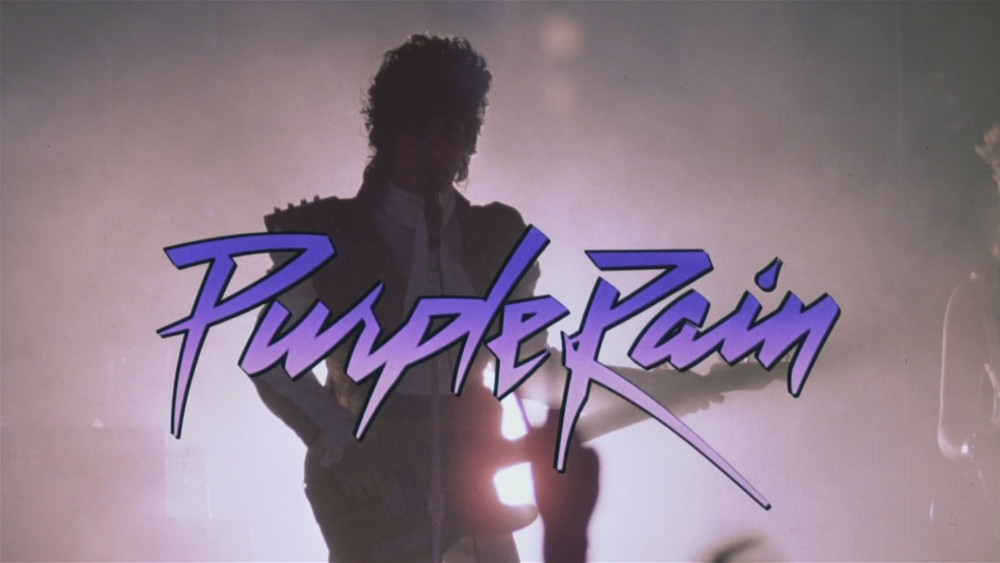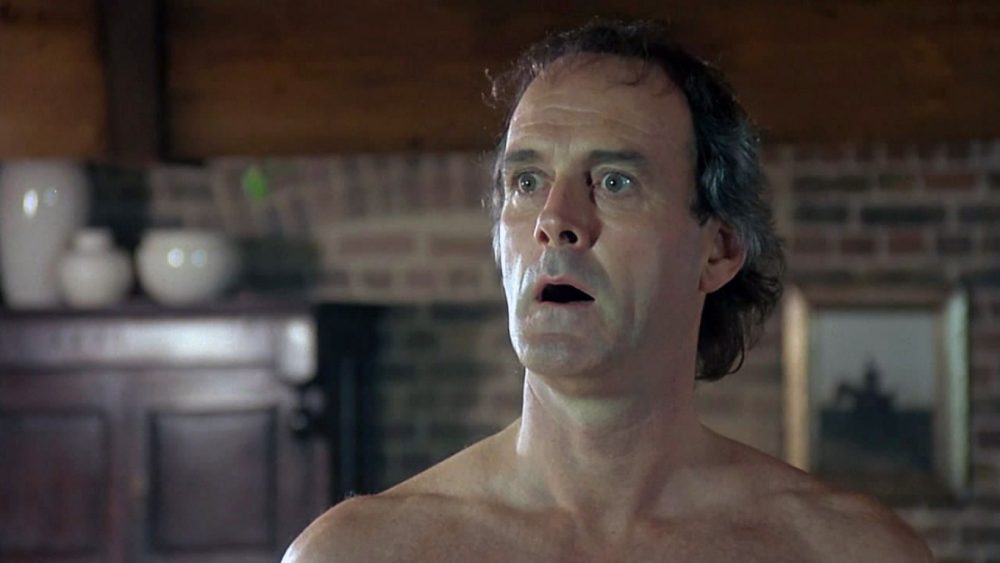“Dearly beloved, we are gathered here today to get through this thing called life.”
I’d quote the rest of the lyrics to Prince’s “Let’s Get Crazy”, but the internet exists already so there’s no reason for that. As an opening line of dialogue — and I say dialogue because so much of the emotion in Albert Magnoli’s Purple Rain is told through music — it’s a precursor for what’s to come: a pretty fascinating, musically driven, exploration of a man riddled with insecurity and an inability to take hold of the reins of life.
In Purple Rain, Prince stars as The Kid, precisely the guy just described above, with a cavalcade of issues to his talented name. He rolls with a band, The Revolution, most of whom rightfully consider him an egocentric asshole with his constant rejection of their artistic input. The owner of the place he performs at — only one song per show to maintain a certain mysterious allure — is growing weary of the way The Kid brings his issues on stage, as well as the fact that he’s not drawing in the crowds like he used to. His main competitor Morris, well-versed in the art of funk and crowd-pleasing, is edging him out of the club and poorly attempting to steal his lady, Apollonia, who just entered the scene and dreams of being a performer herself.
Most importantly to the unfolding of the film is the last of his issues: he’s plagued with living in a broken home, with two parents in an abusive relationship that he can’t stand bearing witness to, but finds himself terrified of bringing into his own love life. It’s a particularly interesting narrative thread to look it because of how it affects practically every inch of the movie, from Prince’s performance as The Kid to its impeccable editing of scene after scene.
From its opening number, director Albert Magnoli and co-editor Ken Robinson pretty much immediately establish that this is going to be a film full of energy, cutting from The Kid to his audience to the pre-show prep to pinball machines to people working on the sound. It jumps from moment to moment, never feeling out of place even when “Let’s Go Crazy” features a montage of its supporting actors going through the motions of how they all step into The Kid’s life. Even when it culminates in a scene with over a dozen individual shots in four seconds (all strung together by Prince running his finger over his lips), it’s all perfectly executed to establish the character. He’s intoxicated by the art of performing; the audience cheering him on and the woman he’d soon fall in love with staring at him only fueling his ego to the dangerous levels that the film would soon address.
Ego and familial issues go hand in hand in Purple Rain, with both of The Kid’s parents being people who threw away their careers due to an inability to manage their personal troubles. Not a scene involving his parents go by where there isn’t a clear showcase of the damage that maintaining a toxic relationship has done to them. It’s harrowing to watch because it’s so raw in its presentation of domestic abuse, each punch coming swiftly and sometimes without warning, and the suicide attempt that comes just before the climactic moments of the film extends the punch to the audience’s gut.
Witnessing these scenes has had a direct impact on The Kid, who finds himself reenacting the volatile relationship between his parents with Apollonia when she reveals she wants to join the new all-girl band of his sort-of rival. In a split second, The Kid beats Apollonia. It’s a moment that I reacted to with immense horror, and, in a moment of extreme discomfort for me, one that I realized most people around me were laughing at. The scene is a surprising one, no doubt, but one that shouldn’t be reacted to with laughs even though it’s such a stark shift in tone. As much as Purple Rain allows itself to be distracted by moments of comic relief, some of which work (with “Lake Minnetonka” as the gold standard) and some of which don’t, scenes of violence are integral to the story and a big part of why songs like “When Doves Cry” and “Purple Rain” actually function.
For everyone to be swayed by the emotion of the climactic song, one must realize that it’s inherently tied to the dramatic events that precede it. Laughter, then, negates the emotion of “Purple Rain” and, to a lesser extent, “When Doves Cry.” The latter song is accompanied by scenes of the two lovers wrapped up in love and The Kid reflecting on the fact that he’s becoming the same man as his father: an egocentric has-been who takes out his frustrations on the woman he supposedly loves.
The lyrics don’t even attempt to hide this notion: “Maybe I’m just too demanding. Maybe I’m just like my father, too bold. Maybe you’re just like my mother, she’s never satisfied. Why do we scream at each other? This is what it sounds like when doves cry.” And a single shot of The Kid in the montage of events that accompany the song in the film show him seated on his motorcycle as a train approaches. It’s arguable that this was just a shot composed for aesthetics, but there’s an inkling of suicidal thoughts in the framing of it, a subtle and impressive bit of foreshadowing upon rewatch.
But, again, Purple Rain isn’t without its perceived imperfections that might lead modern audiences to interpret scenes as humorous rather than serious; Prince’s performance being the leading factor in this. Prince’s dramatic work here — which I find rather brilliant but others find laughable or just plain weird — offers a similar dynamic to many artists who embark on projects that are fueled by their presence, i.e. vanity projects. Most recently, Angelina Jolie in particular was criticized for her film By the Sea, which actually goes interestingly hand in hand with Purple Rain in terms of performance and dramatizing.
Prince, much like Jolie, puts so much attention into the movement of his character as well as the delivery of his dialogue. He’s an actor who commands the attention of the viewer from start to finish because it’s who he is in real life. Every single instance of movement seems choreographed like a dancer, like a performer still trying to put on a performance, even in his most private moments. On-stage and off-stage The Kid aren’t separate entities because, as multiple characters say, The Kid can’t remove his personal life from his professional life as a musician and a performer. It’s why he can go from total and utter glee at the prospect of being given a guitar for no reason other than presumed admiration from a woman he’s involved with to an enraged fit of physical assault on the woman in front of him. Even his name, The Kid, places extra emphasis on the reason his tantrums make so much sense. He’s a child until he’s forced to grow up and face the consequences of his decisions and those of his father, leading us to an immaculate performance of “Purple Rain.”
There are a multitude of instances in the film’s dramatic sequences in which Prince’s movements mirror those that he makes on stage. One bit where he spins around wondering where his father might be in a moment of fear garnered some laughs, but it’s no different than watching him speed across the stage with incredible fluidity in his final numbers. Sure, it’s funny, because there’s no one else in the frame and this isn’t a horror film, where that would be considered a moment of dire tension. And, to an extent, it’s funny because of the fact that it is Prince doing this, who has become an individual audiences find humor in no matter what he’s doing, courtesy of Dave Chappelle, SNL, and even Prince himself to an extent.
But is the fact that it’s Prince in these scenes that negates some of the impact that a moment of domestic violence should be? Or is it simply that audiences, primarily male ones at that, have become so desensitized to this that they’re more than comfortable with laughing at a woman getting beat (which is a conversation that I might not be having had it not been for my mixed feelings on The Hateful Eight actually). In rewatching Purple Rain, this time on 35mm in a packed theater rather than on my laptop, I found myself gripped by a movie from the 80s that, while flawed, actually took a stark interest in showing how tragedy affects an artist, one who is just as flawed as the film he’s a part of. But, just as the artist and his song performances are breathtaking and engrossing, the film he’s a part of is as well. Unnecessary laughter and undeserved Razzies be damned: Purple Rain is a damn great movie about how art and life intersect and nobody can tell me otherwise.
—
Directed by Albert Magnoli; written by Albert Magnoli and William Blinn; starring Prince, Apollonia Kotero, Morris Day, Olga Karlatos, Clarence Williams III, and Jerome Benton; 111 minutes.
Purple Rain is available on DVD and Blu-ray.




 Derek
Derek
 Isabelle
Isabelle